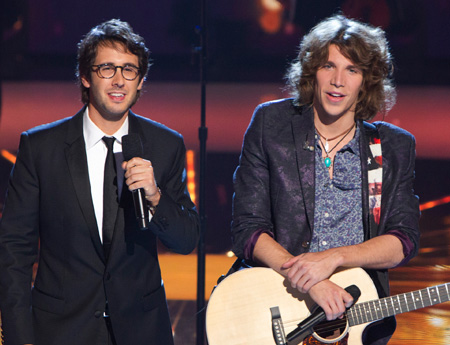In Unscripted, It’s Now All in the Family

The smarter way to stay on top of broadcasting and cable industry. Sign up below
You are now subscribed
Your newsletter sign-up was successful
ABC hired former E! Entertainment president Lisa Berger in September 2013 to head unscripted programming for the network. The following month, former Discovery executive Simon Andreae was tapped to do the same at Fox. Both were outsiders recruited to replace broadcast insiders—John Saade at ABC and Mike Darnell at Fox. Both made their marks with high-profile launches built to spawn franchises.
Then Berger was let go in November and Andreae left Fox in January. Neither made it to even a year-and-a-half on the job. Now, as Fox and ABC hit reset on unscripted, broadcasters are looking toward programming that is light and family-friendly.
Speaking at the TCA winter press tour Jan. 17—one day after Andreae’s departure was announced—Fox Television Group chairman and CEO Dana Walden pointed to American Idol and MasterChef Junior as “an idea of the types of shows in that genre that we’re hoping to populate our schedule with.” Asked later by B&C what about those two shows Fox hoped to replicate, Walden’s fellow chairman and CEO Gary Newman said, “I think that shows that make sense in that space are aspirational, comedic, fun, positive.” He pointed to Fox’s decision, announced in November, to revive Are You Smarter Than a 5th Grader? “For us that’s sort of a perfect fit for what we want the shows to be. It’s family viewing. It’s easy to watch.”
Andreae’s signature project was Utopia, a show that was not easy to watch—at least not in the way that 5th Grader is. Utopia gathered contestants in a remote location to build their own society, featured no winner or prize and was accompanied by a 24/7 live digital-viewing experience. It was canceled after fewer than two months. At ABC, Berger launched Rising Star, a singing competition that took a labyrinthine approach to real-time viewer voting executed across four time zones. It averaged a 1.1 rating in summer 2014 and prompted ABC Entertainment president Paul Lee to say of singing competitions during his Jan. 14 press tour executive session, “I don’t think we’ll try that for a little bit.”
Since The Voice premiered in 2011, averaging a 4.6 live-plus-same-day 18-49 Nielsen rating, broadcast television has launched no reality show able to consistently generate similar numbers. “Of course we’re in pursuit of the next Voice,” said NBC Entertainment chairman Bob Greenblatt. “We’d love to have something that just came out of the gate like that, but it’s hard to find that.”
NBC canceled The Million Second Quiz, its Ryan Seacrest-hosted crack at blending broadcast and 24/7 digital viewing, after one 10-episode season aired over 11 days. But the network has found small-bore success the last two years with celebrity-driven programming such as Hollywood Game Night and Running Wild With Bear Grylls—the latter produced by Andreae’s successor, Corie Henson at Electus. Greenblatt told B&C that the network is working on another project with Grylls as well as “a new format called I Can Do That, which is a celebrity sort of contest game show,” being eyed for a summer launch. And the network already announced in October that it is developing a variety show as a vehicle for Neil Patrick Harris.
But while series rooted in celebrities, kids and contests do not represent a massive shift away from what is proven to work on broadcast, neither did Utopia nor Rising Star. The former had similarities to Survivor and Big Brother. The latter was a singing competition with a host and three judges. Andreae and Berger did not arrive in broadcast and remake it in cable’s image.
The smarter way to stay on top of broadcasting and cable industry. Sign up below
“They tried new and different things, but I don’t necessarily look at what either of them tried and consider it a cable swing,” said Lauren Gellert, WE tv executive VP of programming and development. WE is prepping an adaptation of U.K. series Sex Box, in which couples have sex in a soundproof box, then talk about their relationship. “Utopia certainly wasn’t a cable swing. [Berger] tried Rising Star. Those were both bold, broadcast-style unscripted shows.”
And broadcasters are not likely to stop trying to get such shows to take root.
“We’ve got a lot of things cooking,” said Greenblatt. “And at the same time, we’re always looking for the great, big blockbuster.”
